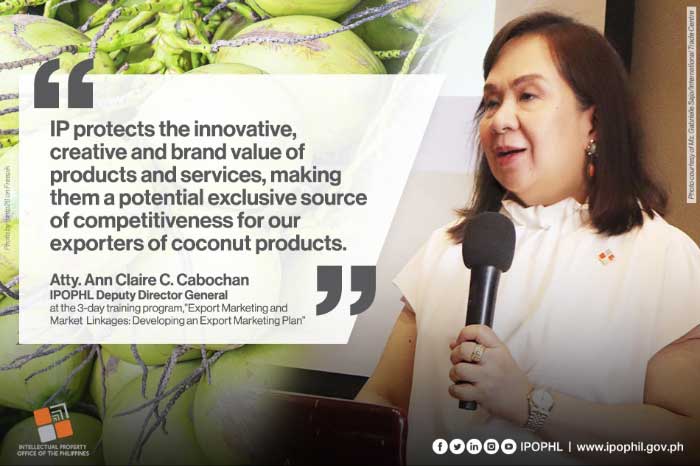
The Intellectual Property Office of the Philippines (IPOPHL) is encouraging traders and producers of coconut products to integrate intellectual property (IP) protection into their export marketing strategies, stressing how a comprehensive IP protection strategy can drive global success for the country’s top dollar-earning agri-based product.
“IP protects the innovative, creative and brand value of products and services, making them a potential exclusive source of competitiveness for our exporters of coconut products,” IPOPHL Deputy Director General Ann Claire C. Cabochan said at a three-day training program organized and held by the International Trade Centre (ITC) and the Department of Trade and Industry (DTI) last June.
Titled “Export Marketing and Market Linkages: Developing an Export Marketing Plan,” the program allowed participants to learn from industry experts and gain best practices in seizing global opportunities, from assessing export readiness to developing and implementing a marketing campaign tailored to a country-market of interest.
Participants also received a full-day training on IP organized in collaboration with IPOPHL. The training discussed the international routes in filing trademarks and patents in foreign markets —the Madrid Protocol and the Patent Cooperation Treaty, respectively. It also underscored the IP system as a vital tool in building the agrifood sector’s global competitiveness.
Cabochan said that “in the long run, protecting the IP rights of coconut industry players could bolster innovation, in line with the Marcos Administration’s goal of fast-tracking the implementation of the Coconut Farmers and Industry Development Plan (CFIDP).”
The CFIDP, which helps fulfill Republic Act 11524 or the Coconut Farmers and Industry Fund Act of 2021, seeks to harness the power of science and modern technologies, among others, as it hikes the country’s average annual coconut production to 150 nuts per tree — more than thrice the current output — and bring new opportunities to provide decent incomes to the 2.5 million coconut farmers in the country1.
Maura Pasciolco, a participant and owner of Quezon’s Best, a local coconut manufacturing company, expressed her gratitude for the training program, saying the workshop was “an eye-opener” for businesses like her with global ambitions.
“It provided us with a clear roadmap to enter international markets and develop an effective export marketing plan. We now feel confident in taking our business to the global stage,” she added.
“We are committed to supporting Philippine businesses in their export endeavors. By equipping them with the necessary skills and knowledge, we aim to empower local companies to compete globally and contribute to the country’s export growth” said Cristina Collado Marti, ITC program officer.
Participants left the program with actionable insights, a comprehensive understanding of export marketing and a strong foundation to develop their export marketing plans.
The event was supported by ARISE Plus Philippines, an EU-funded project that seeks to help businesses thrive globally by providing training and other resources. The project is led by the DTI in partnership with the Department of Agriculture, Food and Drug Administration, Bureau of Customs, the Department of Science and Technology and the private sector. The ITC serves as the technical agency for the project.
Through ARISE Plus, the DTI and the ITC will hold more training sessions in the latter half of 2023 to help the coconut sector learn international market requirements, techniques in negotiating with international buyers and the steps to participate in trade shows.
__________________
1 https://www.da.gov.ph/cfidp-launched-to-strengthen-phl-coconut-industry/






















